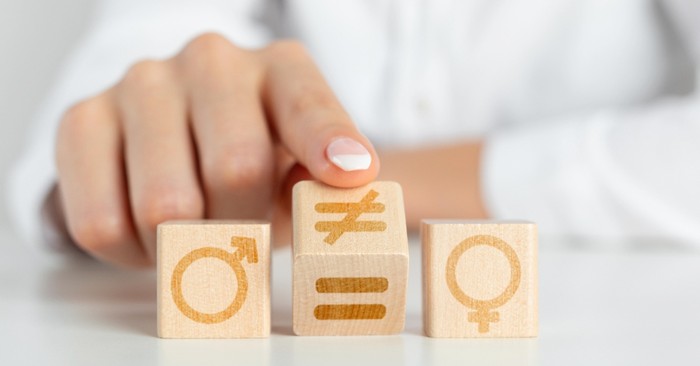8 Reasons Why the Bible Is Not Sexist
- David Marvin Pastor of CityBridge Community Church
- Updated Oct 21, 2024

On June 29, 2018, my wife gave birth to our daughter, Monroe, and my life was never the same. She was not our first child, but our first daughter.
Our lives ever since have been filled with her passion for pink and her love for dresses, princesses, and dolls. Not that every girl loves these things, but she certainly does.
I know there's going to be a lot of milestones in her life that will be significant. Her first day of school, last day of school, learning to drive a car, going on her first date, maybe getting married, and maybe having children.
But as a Christian, there is no milestone more important than “when she becomes a Christian.” This will shape her life going forward, and eternity. Our prayer, of course, is that, hopefully, she does.
There is one question I want to address that could potentially play a huge role in being a barrier to her coming to Christ. This is for her and for anyone who has heard it suggested from the world around us.
That question is this: is the Bible sexist?
Is Christianity sexist? Is it biased towards men, not women? I believe the answer to these questions, and others like it, is emphatically, “No.” In fact, I want to show you the opposite is true.
The Christian movement has been the single greatest cause, for human rights generally, and for women specifically in history.
Christianity is the most pro-force for women that has ever existed. To do so, I've got to cover a lot of historical ground and bring a lot of us into a bigger perspective.
Women, before Christ, were considered worthless and inferior. In the Roman empire in which Jesus grew up, women were considered legal property under male control.
Thanks to the law of the day, “Patria potestas” established that the head of the home and control of all members of the family was the father. Women were legally under their rule.
Women couldn't own possessions, testify in court, or make marriage decisions, essentially belonging to their father or husband. The Greek philosophers Aristotle and Plato claimed women had “no souls” and were “inferior” beings.
For Romans, only the firstborn daughter had to be kept — after that, you were free to “expose” or abandon subsequent female babies. Fathers routinely left unwanted infant girls to die of exposure beside roads.
Recent population records from an ancient Roman city, discovered out of 600 families surveyed, merely six had more than one daughter.
Sadly, even Jewish culture in the first century wasn’t much better. A common Jewish prayer thanked God “for not making the man a gentile, slave, or woman.” The idea that women were inferior permeated the pre-Christian world.
Girls were forced into arranged marriages around ages 12-13 to maximize childbearing years. Women couldn’t divorce, but men could take lovers freely. If a wife committed adultery, however, she might be executed. In short, women had no equality.
1. Jesus’ Radical Respect for Women
Jesus' interactions with women upended social conventions. He engaged them in public theological dialogue, like his lengthy conversation with the Samaritan woman at the well (John 4).
His disciples were shocked that He spoke freely with her. He didn’t just speak with her; she was the very first person He told that “He was the Messiah” (John 4:26).
Jesus welcomed women as disciples who learned from Him, contradicting rabbis who declared the scriptures “should burn rather than be taught to women.”
For example, when the adulterous woman was brought to Jesus, he refused to condemn her even as he told her to leave her sin. His grace affirmed her dignity (John 8).
2. New Dignity for Women in the Early Church
The early church continued applying Jesus' countercultural respect for women. Peter called “husbands to be considerate and honor their wives” (1 Peter 3:7).
Paul wrote, “There is no distinction between male and female — all are one in Christ” (Galatians 3:28).
To us, the idea that “men and women have equal value” is something we just assume. But that’s because of the widespread influence that Christianity has had on our world, specifically on Western thinking. But when the New Testament was new, this mentality was as well.
Historian Rodney Stark estimates that two-thirds of the early church was made up of women. Women flooded the early church because they were treated with dignity for the first time. Widows and female slaves were given leadership roles as deaconesses.
Christian teachings revolutionized marriage and family. Even first-century critics of the church attacked the movement of Christianity for being a group that appealed to women and lower classes.
3. Invention of Infant Adoption
The Christian view of daughters marked a dramatic departure from Roman norms. Since unwanted infant girls were left to die, Christians began adopting these abandoned babies because they believed every life is valuable because all people are made in God’s image. Novel to this era, Christians introduced the world to infant adoption.
Likewise, the early church rejected prevalent abortion and infanticide of girls. As Tertullian wrote, "We do not destroy even the fetus in the womb...To prevent birth is anticipated murder." By condemning these practices, Christianity ensured more daughters survived to adulthood.
4. Effects of Christianity's Pro-Woman Vision
As Christian influence spread, women's social position rose wherever the gospel took root. Basic rights like voting, owning property, and accessing education —arose centuries earlier in Christian cultures than elsewhere due to biblical beliefs like the innate equality of men and women.
Indeed, Christianity has proven to be the single greatest force in advancing women's rights and standing throughout history. Jesus' high view of females, evident in first-century biblical accounts, has shaped societies ever since.
5. The Non-Christian World Still Devalues Women
Wherever the biblical vision of equal human dignity is ignored, women continue to be oppressed.
Here are some sobering current examples:
- Female infanticide and selective abortion lead to skewed gender ratios in China and India.
- Three million girls are annually subjected to genital mutilation in Africa.
- Child marriage remains widespread, with 12 million underage girls married each year.
- The Taliban's severe control of Afghan women denies education, employment, and basic freedoms.
- Saudi Arabia's guardianship laws restrict women's rights and movement; Women are blocked from soccer matches in Iran.
These are just some of the many examples of the demeaning views of women that persist in our world where Christian influence has not been widespread.
6. Problems in Our Post-Christian Society
As Western culture abandons its biblical roots, it predictably struggles to value women properly. On one extreme, it sexually commodifies women based on physical appearance. Yet, on the other, it suggests a woman's worth comes from sexual expression.
But Christianity has always declared that human significance flows from the image of God — not superficial traits.
Both depersonalizing women and defining them by sexuality represent moves away from the biblical vision that so transformed history.
7. Christians Are Called to Promote God's Superior Vision
For 2000 years, Jesus' revolutionary example has propelled increasing dignity for women globally. The Christian understanding of intrinsic human value remains desperately needed today.
The church has the honor of articulating and advancing the biblical view of man and woman together, reflecting God's image: Male and female bear equal glory as image bearers.
As believers, we promote a culture that upholds the beauty of God's design and the sacred worth of every soul.
8. The Heart of Your Heavenly Father
A couple of months ago, my wife and I found out that we were pregnant with our fourth child — a second daughter.
As a father who loves and cares deeply about my kids, I pray often that God would allow them to trust in Christ at an early age, and that they would live a full life walking in a full relationship with Him.
It breaks my heart to imagine how cultural lies around Christ, Christianity, and the church being “sexist” could possibly create a barrier to them knowing Jesus.
I can only imagine how it breaks the heart of our Heavenly Father, whose love far exceeds any earthly parents' love for their children.
Lastly, to anyone who reads this and hasn’t had the experience of the church and Christianity treating you with the dignity and honor you deserve as an image bearer of God himself, I am really sorry.
Your worth is of such great value that God would send His son to lay down his life, for you. My prayer is that God’s grace would fill in the gaps in your heart where His church failed to embrace and celebrate God’s beautiful design and your God-given value.
What do you think? Have you struggled with verses related to women in the Bible? Do you agree with these points? Join the discussion on Crosswalk Forums!
For further reading:
What Does the Bible Say about the Value of Women?
How Did Jesus Treat Women in the Bible?
Photo Credit: ©iStock/Getty Images Plus/bymuratdeniz





















